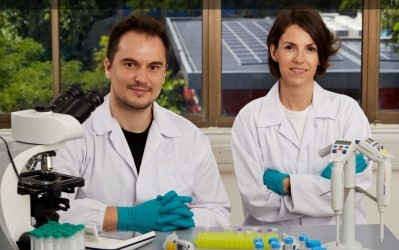OPINION ARTICLE
Leveraging the microbiome for functional food success

Comprising trillions of diverse bacteria and microbes that colonise our tissues, organs, and environment, the microbiome carries out essential processes such as the processing and breakdown of food and associated nutrients in the gut. And given it is also increasingly recognised as playing a vital role in physiology and health, no wonder there is increased interest in this hidden, human biosystem.
Researchers want to develop functional foods and nutrition solutions targeting restoration of an altered microbiome, as well as architect novel probiotics that meet specific nutrition requirements. In parallel, foods and ingredients that modulate and restore the gut microbiome have moved to the forefront of the nutraceuticals and food and beverage (F&B) innovation landscape.
The need for better data insight toolsets
But it’s becoming inescapable that such advancements can only be achieved with a more sophisticated understanding and application of the microbiome. Gaining this understanding is far from trivial. Managing the complex multi-omic data relating to the microbiome has been a significant barrier to success. Significant wasted time and effort associated with working with unreliable data, along with siloed and outdated processes which are difficult to scale-up to further stages of development, have been some of the biggest headaches for researchers.
The good news is solutions to these challenges are beginning to emerge. Key to these advances is better ways of working with data. Tech innovators see automation and artificial intelligence (AI)-based tools and platforms that can help perform contextualised data capture, curation, and reporting on microbiome data as being genuine game-changers here.
As a result, AI and machine learning (ML) tools are beginning to be integrated with microbiome analysis platforms to develop microbiome-modulating F&B products which can prevent and manage a wide range of diseases. Such outputs are highly predictive: analysis of gut microbiome can be used to predict disease susceptibility and assess individual metabolic responses to food, for example. They can also be personalised, with work commencing on sequencing and analysis of individual gut microbiomes to develop specific nutrition and dietary recommendations. Opportunities include:
Screening Novel Probiotics Comparative analysis of inflammation, fitness, obesity, and corresponding changes in microbiome composition can be integrated with network analysis to identify novel probiotic strains. And with use of ML, the cost and time of probiotic screening and development is being drastically reduced
Personalised Nutrition/Sports Nutrition AI-enabled algorithms coupled with microbiome profiling platforms are starting to provide personalised diet recommendations, as well get new and highly effective probiotic formulations in sports drinks and supplements quicker to market
Affordable Nutrition (Microbiota Directed Foods (MDFs)) Opportunities to develop affordable nutrition to lower-income groups at a higher risk of malnutrition are starting to emerge
Metabolic Disorders (Weight/Diabetes) The growing body of evidence linking metabolic disorders, especially obesity and diabetes has prompted the development of several products looking to leverage the microbiome
Cognitive Nutrition Gut microbiome has a huge influence on neurodevelopment. An unhealthy early life diet can also lead to cognitive dysfunction, so ensuring nutritional interventions (e.g., with essential micronutrients) can help in preventing later life challenges that could lead to expensive, long-term medical intervention
Immunity Building There is a strong link between immunity and microbiome composition. AI and next-generation sequencing technologies are already being used
Solutions to challenges in health, food, and farming
Cargill Health Technologies (CTH) envisions expanding into the food and beverage segments via the microbiome, employing new research techniques that will elevate its team’s understanding of the relationships between diet, the gut and its microflora, and the immune system. Cargill is currently optimising its supply chain through understanding what makes healthier, faster growing, disease resistant animals (think antibiotic-free chickens), for instance, and how that can promote better human health.
Danone has been leveraging microbiome data sciences research to develop its portfolio of infant and adult nutrition products. Danone Nutricia Research, the research and innovation division of Danone S.A in partnership with the University of California, San Diego, has launched The Microsetta Initiative, which is a large scale, gut microbiome mapping project in US, that will give broad insights into gut health and its link with health and wellness. This in turn would pave the way for the development of novel probiotics and functional foods.
Over the past few years, Nestlé has been reinforcing microbiome research via collaborations and product development partnerships to develop innovative products for promoting health and wellness.
Nestlé is investing heavily in microbiome research to support the development of personalized nutrition products based on individual microbiomes. The company is partnering with the University of California (San Diego)’s Center for Microbiome Innovation (CMI) to accelerate microbiome research and has partnerships with Enterome, Seres Therapeutics, and so on.
I hope you agree that the microbiome offers great hope for finding solutions to challenges in human health. To make this a reality it will be critical to enable a truly ‘data-driven’ partnership between biology and technology. This goal is eminently worth pursuing, as improved knowledge of the microbiome will translate to a better quality of life for us all.
The author is Director of Biodata Innovation at Eagle Genomics, a Cambridge, UK-based pioneer in applying network science to biology which is working with 5 of the top 10 household and personal care companies in the world to create new products working in harmony with the human and environmental microbiome.
Explore this analysis of microbiome trends from Eagle Genomics and Frost & Sullivan in greater detail in ‘Microbiome Technologies Transforming Health & Wellness’
















